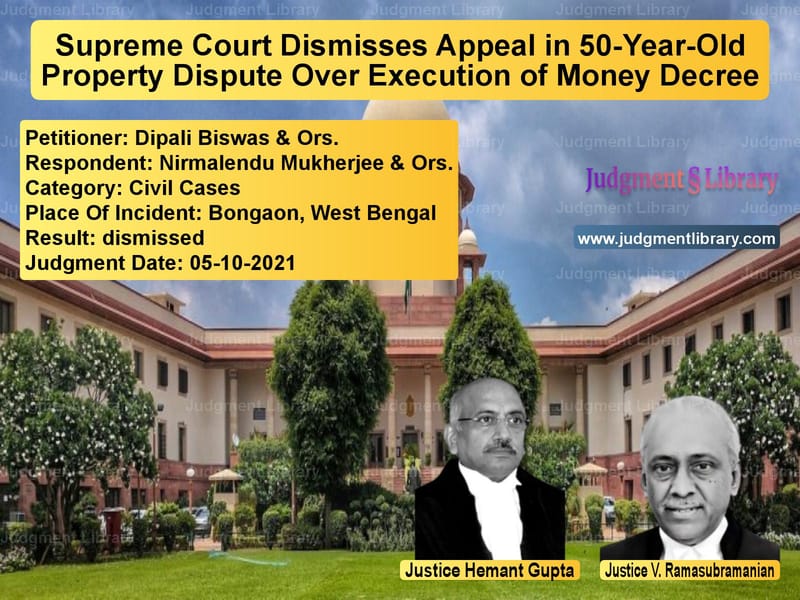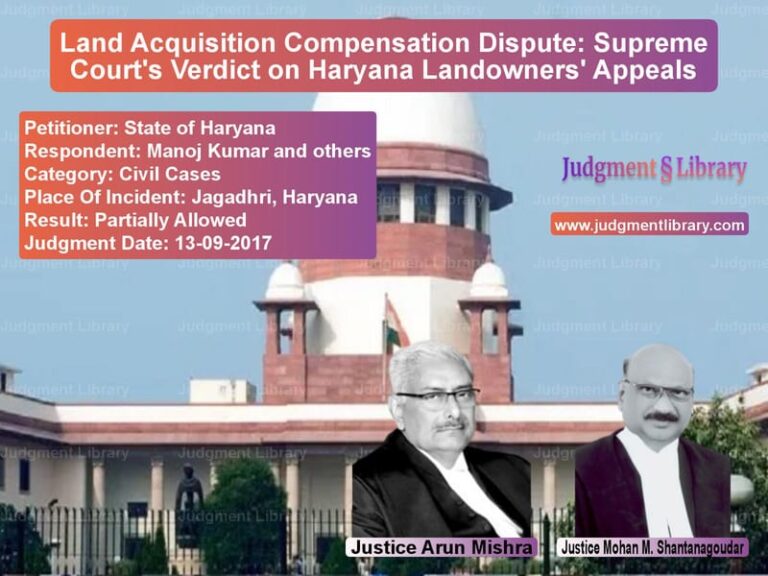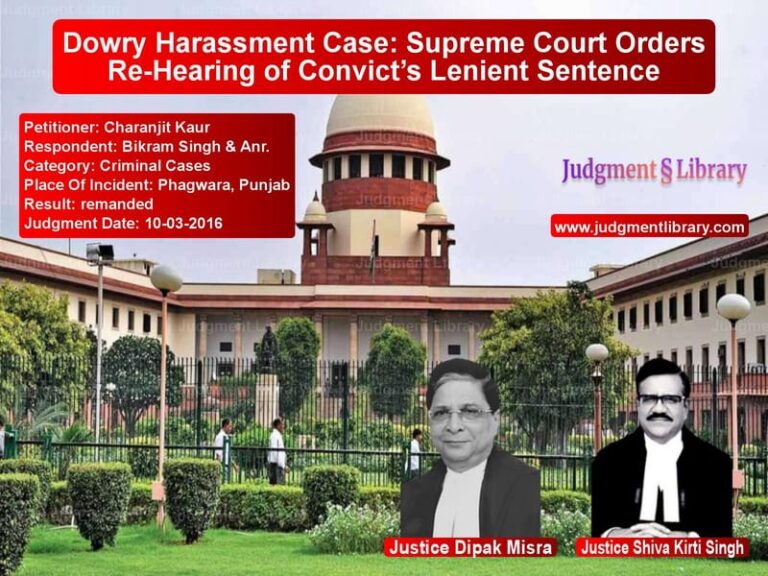Supreme Court Dismisses Appeal in 50-Year-Old Property Dispute Over Execution of Money Decree
The Supreme Court of India recently ruled on a half-century-old litigation concerning the execution of a money decree, dismissing an appeal filed by the legal representatives of the judgment-debtor. The case, Dipali Biswas & Ors. vs. Nirmalendu Mukherjee & Ors., involved multiple rounds of litigation spanning five decades, arising from the execution of a simple money decree dating back to 1971. The Court upheld the sale of the judgment-debtor’s property in auction, rejecting objections raised under Section 47 of the Code of Civil Procedure, 1908 (CPC).
Background of the Case
The litigation began in 1971 when Rama Rani Devi filed Money Suit No.16 of 1971 before the District Munsif Court, Bongaon, West Bengal, seeking recovery of Rs. 3,000 from Sasadhar Biswas, the judgment-debtor. The suit was decreed ex parte on July 25, 1974, allowing Biswas to pay the amount in six equal installments, with a default clause.
After Biswas defaulted, the decree-holder filed Execution Case No.2 of 1975, seeking attachment and sale of 17 decimals (approximately 7,450 sq. ft.) of land. Despite multiple attempts by the judgment-debtor to halt the sale, the property was auctioned on May 30, 1979, to two brothers, Sachindra Nath Mukherjee and Dulal Kanti Mukherjee, for Rs. 5,500. The auction purchasers deposited the amount in court.
Litigation History: Five Rounds of Legal Battles
The execution proceedings led to five separate rounds of litigation:
- First Round (1979-1992): The judgment-debtor challenged the auction under Order XXI, Rule 90 CPC, alleging irregularities in the sale proclamation. A compromise agreement was reached with the auction purchasers on July 19, 1980, allowing Biswas to reclaim his property if he repaid the full amount by December 15, 1980. However, he deposited only Rs. 3,700 instead of Rs. 5,500. The executing court initially recorded satisfaction of the decree, but this order was later set aside by the High Court in 1990, confirming the auction sale in favor of the purchasers.
- Second Round (1992): Biswas filed Suit No.249 of 1992, seeking a declaration that the auction sale was void. The suit was dismissed as abated.
- Third Round (1994-2001): The auction purchasers sought a sale certificate, which was issued on February 8, 1994. Biswas challenged this in a revision petition before the High Court, but his plea was dismissed in 2001.
- Fourth Round (2002-2005): The auction purchasers filed for possession. The executing court ordered delivery on March 15, 2002. The judgment-debtor’s legal heirs challenged this, but the High Court dismissed their appeal in 2005. The Supreme Court also dismissed their special leave petition in 2005 and subsequent review petition in 2006.
- Fifth Round (2006-Present): In 2006, the legal representatives of Biswas filed a fresh application under Section 47 CPC, challenging the auction on the ground that Order XXI, Rule 64 CPC was not followed. This was dismissed by the executing court in 2007, and the High Court upheld the dismissal in 2008.
Arguments by the Petitioners (Legal Heirs of Sasadhar Biswas)
The appellants contended that:
- The executing court violated Order XXI, Rule 64 CPC, which mandates selling only so much of the property as necessary to satisfy the decree.
- The sale should have been limited to a portion of the 17 decimals of land, rather than auctioning the entire property.
- The auction sale was invalid as the decree amount was much lower than the sale proceeds.
- Their objections were jurisdictional in nature and could be raised at any stage.
Arguments by the Respondents (Auction Purchasers)
The auction purchasers countered that:
- The objections were raised belatedly in 2006, nearly three decades after the auction.
- The judgment-debtor had previously filed multiple challenges, all of which were dismissed.
- The High Court’s 1990 order had attained finality, barring further objections.
- The executing court had conducted the auction properly, and no material irregularities were found.
Supreme Court’s Judgment
The Supreme Court dismissed the appeal, making the following key observations:
- The petitioners had exhausted all available remedies over five rounds of litigation spanning 50 years.
- “A judgment-debtor cannot be allowed to challenge the execution proceedings indefinitely on frivolous grounds.”
- The objections under Order XXI, Rule 64 CPC should have been raised at the time of the sale proclamation, not decades later.
- The High Court’s 1990 order, which confirmed the sale, had attained finality, making any further challenge untenable.
- The auction sale had been duly confirmed, and a sale certificate was issued in 1994, vesting ownership in the auction purchasers.
Conclusion
The Supreme Court’s ruling brings an end to a 50-year-old litigation, reaffirming that execution proceedings cannot be stalled indefinitely through repeated objections. The judgment sets a precedent for preventing misuse of procedural provisions in execution cases and ensures that auction purchasers receive legal protection against frivolous challenges.
Petitioner Name: Dipali Biswas & Ors..Respondent Name: Nirmalendu Mukherjee & Ors..Judgment By: Justice Hemant Gupta, Justice V. Ramasubramanian.Place Of Incident: Bongaon, West Bengal.Judgment Date: 05-10-2021.
Don’t miss out on the full details! Download the complete judgment in PDF format below and gain valuable insights instantly!
Download Judgment: dipali-biswas-&-ors.-vs-nirmalendu-mukherjee-supreme-court-of-india-judgment-dated-05-10-2021.pdf
Directly Download Judgment: Directly download this Judgment
See all petitions in Property Disputes
See all petitions in Contract Disputes
See all petitions in Debt Recovery
See all petitions in Judgment by Hemant Gupta
See all petitions in Judgment by V. Ramasubramanian
See all petitions in dismissed
See all petitions in supreme court of India judgments October 2021
See all petitions in 2021 judgments
See all posts in Civil Cases Category
See all allowed petitions in Civil Cases Category
See all Dismissed petitions in Civil Cases Category
See all partially allowed petitions in Civil Cases Category







